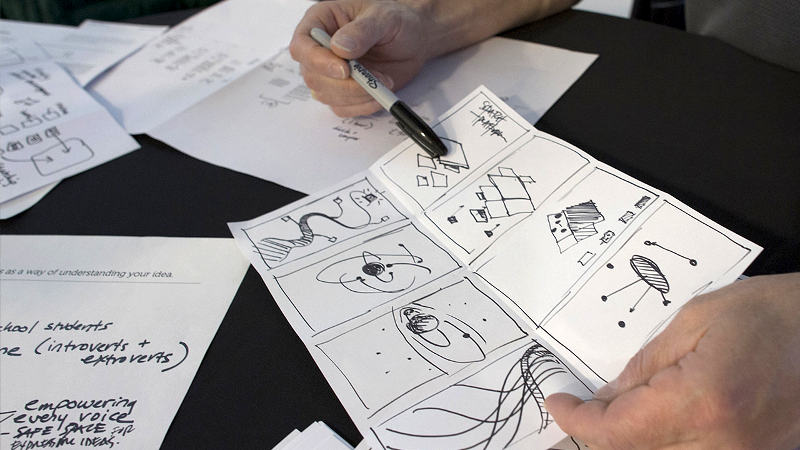UDL Innovation Through a Collaborative Learning App Design Challenge

Challenges & Opportunities
The maker education movement signals a return to apprenticeship models and constructivist, project-based learning and instruction, where students learn by engaging with and solving authentic, complex challenges. Makerspaces are being adopted by k-12 schools across the country, and opportunities to learn through making are promoting hands-on learning and 21st Century skill development, such as critical thinking and problem solving, self-regulation and planning, and communication and collaboration.
Students who typically struggle academically are thriving in maker-based educational programs, as are English Language Learners and students underrepresented in STEM subjects (Science, Technology, Engineering, and Math). While this is great news, the process of making to learn is not great for everyone. The process skills needed to successfully engage in makerspace experiences are many. They include metacognitive processes such as persistence, iteration, and intentionality, as well as socio-emotional learning skills. Communication and collaboration skills are particularly relevant in this context — critical to success in learning and to life beyond the classroom. We wondered: How might we remove barriers to makerspace experiences and support positive outcomes?
Part of our goal was to widen the net around who has a seat at the design innovation table. Applying UDL principles to the design thinking process helped participants feel that this was a space for them — that their voice was important in EdTech innovation and experience design for learning.
Kim Ducharme, Organizer
CAST’s Anne Meyer & David Rose Founders' Fund for Innovation was set up to inspire and support innovation. CAST staff Kim Ducharme, Kevin Kent, Jen Dee, Janet Gronneberg, and Mindy Johnson saw this as an opportunity to extend their work in new directions, to explore how Universal Design for Learning (UDL) could be leveraged specifically to address the challenges inherent within the context of collaborative learning in maker educational experiences. A two-day design challenge was proposed, in collaboration with the Experience Design for Learning meetup, in the heart of Boston’s seaport innovation district.
Strategies & Solutions

Our goals were three-fold:
- Push the envelope on how UDL can be used as a lever to arrive at innovative solutions and app ideas
- Widen the UDL circle to new audiences, disciplines, and communities in unique ways through the lens and experience of a design process
- Apply UDL to the design challenge process itself, of innovation to widen the participant pool and support a wider range of participants into the process of design innovation for learning
We started off with knowledge-building around collaborative learning, maker education, and UDL methodology. We then proceeded through a fairly typical, but UDL-infused, design thinking process to define the problem space, then brainstorm, sketch, prototype, pitch solutions to a panel of industry experts.
After years of waiting for someone to create the products I need to teach effectively in the classroom, it was so liberating to be able to roll up my sleeves with so many sharp, intelligent people and actually build it ourselves.
Participant
Successes
The event and outcomes truly exceeded our expectations. Teams leveraged UDL to create more inclusive solutions for supporting collaborative learning. The event brought UDL to a wider audience and in new ways, and staff deepened their learnings and skill sets around everything from collaborative learning theories to applying UDL design processes for innovation.
The event resulted in some great app solutions to the challenges of collaborative learning: One team chose to support teachers unfamiliar or inexperienced at facilitating learner-driven projects and curricula; other teams empowered students’ intellectual risk-taking and agency in their learning; and several teams chose to support optimal maker experiences for introverts, and, true to UDL form, all learners benefit!
Staff learning abounded. Properly setting up the design challenge required landscape and literature reviews into collaborative learning theory, and shaping and facilitating design processes for innovation brought more staff into the design fold. Finally, we were able to hone UDL processes for making design challenges a good experience for all participants.
Through the Collaborative Learning App Design Challenge, we were able to explore both great solutions to better support collaborative learning for all, and how UDL methods can inform the very process of design innovation itself. CAST has additional design challenges in the works for other topics and contexts, and is developing an innovator program to support teams with promising ideas to refine and fully develop their projects, in consultation with CAST.
Visit the CAST Design Challenge website
Learn more about the EdTech Design Challenge project
Help support more work like this.
Your tax-deductible donation to CAST supports exciting projects like these through our Founders' Fund for Innovation. Help us keep busting barriers wherever learning happens, until learning has no limits. Thank you.
Learn more about the Anne Meyer & David Rose Founders' Fund for Innovation
